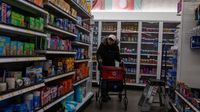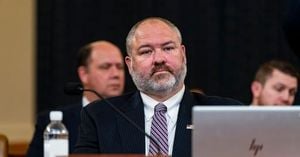U.S. consumer sentiment has hit a new low as inflation fears escalate, according to the latest survey from the University of Michigan released on April 11, 2025. The preliminary consumer sentiment index fell to 50.8, marking an 11% drop from March and the lowest level since June 2022. This reading is particularly alarming as it is now the second-lowest in the survey's history, trailing only the depths of the Great Recession.
Americans are feeling increasingly pessimistic about the economy, with sentiment down more than 30% since December 2024. This decline has been attributed to President Donald Trump's ongoing tariff policies, which many believe are stoking inflation and threatening economic growth. "Consumers report multiple warning signs that raise the risk of recession: expectations for business conditions, personal finances, incomes, inflation, and labor markets all continued to deteriorate this month," said Joanne Hsu, the survey director.
The sentiment index's drop to 50.8 represents a 10.9% decline from the previous month and is 34.2% lower than a year ago, indicating a pervasive sense of unease across all demographics. The survey, which captures responses from March 25 to April 8, does not reflect the immediate aftermath of Trump's announcement on April 9 of a 90-day freeze on reciprocal tariffs against several nations.
Inflation expectations have surged dramatically, with respondents anticipating a year-ahead inflation rate of 6.7%, the highest level recorded since 1981. This is a sharp increase from 5% in March. Expectations for inflation over the next five to ten years also climbed to 4.4%, reflecting a growing concern among consumers about rising prices.
The University of Michigan's findings echo concerns voiced by corporate leaders and economists about a potential recession. BlackRock CEO Larry Fink warned, "I think we're very close, if not in, a recession now," highlighting the financial community's growing anxiety. The sentiment index's decline is particularly concerning as consumer spending accounts for about 70% of the U.S. economy.
Despite the grim outlook from consumers, some economic indicators remain positive. The Consumer Price Index showed a decrease in overall prices in March, largely due to falling gasoline prices, and unemployment filings remain low. Nonetheless, the fear of inflation and recession is palpable, with many consumers expressing worries about their financial futures.
"This decline was, like the last month’s, pervasive and unanimous across age, income, education, geographic region, and political affiliation," Hsu noted. The sentiment has deteriorated significantly amid ongoing trade tensions and fluctuating tariff policies. While Trump has paused some tariff hikes, he has maintained a 10% baseline duty on all imports and specific tariffs on certain products.
In response to U.S. tariffs, China has retaliated by raising duties on U.S. imports to 125%, further complicating the economic landscape. The ongoing trade war has created a climate of uncertainty that is affecting consumer confidence and spending habits.
As consumers grapple with the implications of tariffs and rising prices, fears of unemployment have also increased. The survey indicated that the share of consumers expecting job losses in the next year has more than doubled since November 2024, reaching levels not seen since 2009.
Economic analysts are closely monitoring how consumer sentiment translates into spending, especially as many Americans have continued to spend despite negative sentiment. "Sometimes the surveys are very negative, but they keep spending," said Federal Reserve Chair Jerome Powell. However, the recent turbulence in financial markets, coupled with rising inflation expectations, may soon change this trend.
While there are some signs of resilience in the economy, the combination of high inflation expectations and concerns about recession could lead to what some economists are calling stagflation—a situation of stagnant economic growth combined with high inflation.
The Federal Reserve is particularly concerned about the impact of consumer inflation expectations on monetary policy. If consumers lose faith that inflation will return to normal levels, it could complicate efforts to stabilize prices. "History teaches that when higher inflation expectations become entrenched, the road back to price stability is longer, the labor market is weaker and the economic scars are deeper," said Dallas Fed President Lorie Logan.
As the economic landscape continues to shift, the sentiment index serves as a crucial indicator of consumer confidence and potential future spending. The University of Michigan's survey reflects a growing anxiety among Americans as they navigate the complexities of the current economic climate, shaped by tariffs, inflation, and uncertain job prospects.
In summary, the April consumer sentiment survey paints a troubling picture of the U.S. economy. With inflation expectations at their highest in decades and fears of recession looming large, the outlook for consumer spending remains uncertain. As the situation evolves, both consumers and policymakers will be watching closely to see how these trends unfold in the coming months.







